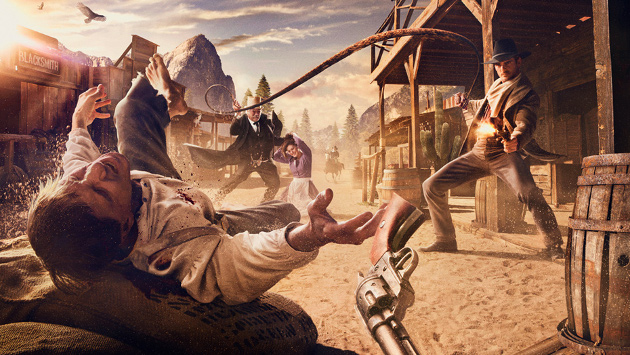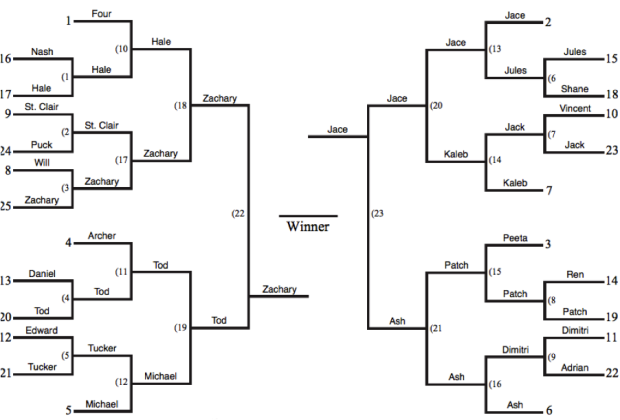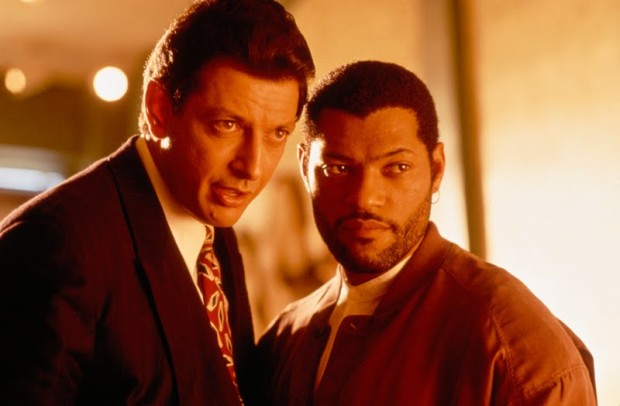Search Results for: scriptshadow 250

I continue to work hard on the Scriptshadow Dialogue Book. One of the most time-consuming parts of the process has been cross-checking all the tips against my favorite movies.
I’ll watch a favorite movie and, with each scene, make sure that the dialogue being spoken doesn’t contradict anything I’m saying in my book. For the most part, it’s gone great. Everything that I’ve watched lines up perfectly with the tips I’ve written.
And then I read Sideways.
For those of you who don’t know, Sideways is a movie that came out in 2005 about two friends in their 40s, eternal pessimist Miles and sex addict, Jack, who go on a wine-tasting weekend the week before Jack gets married. The screenplay, written by Alexander Payne and Jim Taylor, won the Academy Award for best adaptation.
In order to understand why this script threw a wrench into my previously perfect book, you must first understand the principle tenets I’m building the book around. Namely that every dialogue scene needs to be motivated by a character who wants something.
Typically, that something is a goal – such as needing advice or needing to confess – or the need to solve a problem – such as a car breaks down on the side of a deserted road; what do you do? But, mainly, there needs to be purpose in the scene, and that purpose needs to be driven by the characters.
Then I read Sideways and in the first half of the screenplay, there were, at most, three scenes that abided by this rule. Characters were speaking to speak. Sometimes just to fill up time. And I’m thinking… wait a minute here. This goes against everything I believe.
Here’s a scene from early in the script, when Miles comes to pick up Jack. Miles is thrust into a room with Jack, his fiancé, and his fiancé’s family. Notice how there’s no one here with any real goal (the cake tasting gets them in here but it’s not a true goal since it’s inconsequential). Nobody really wants to talk to each other. They’re just talking cause they’re stuck in the same room for a moment.

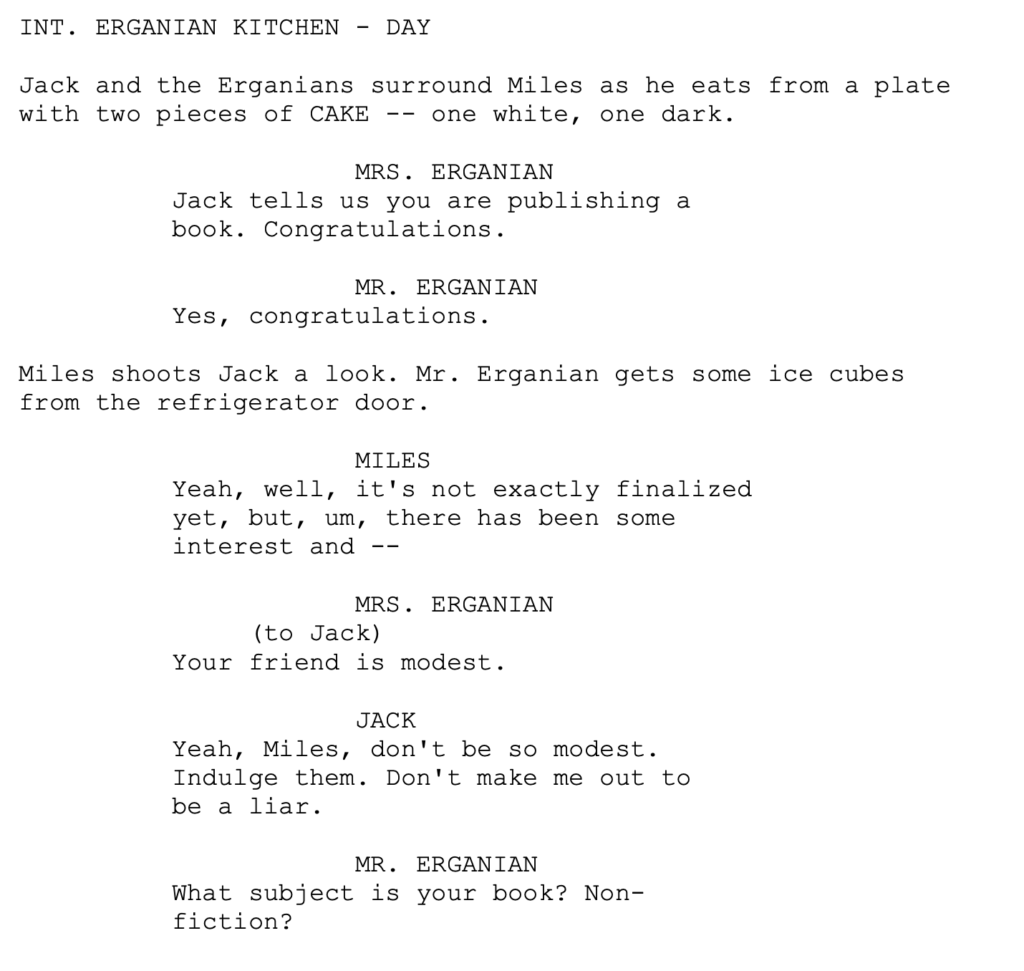
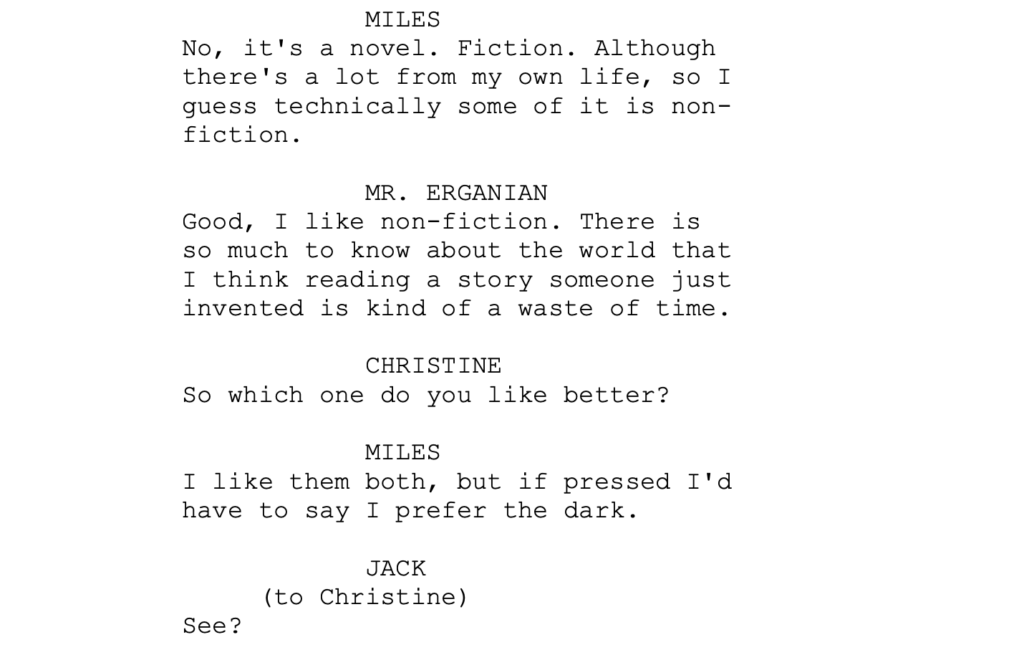
Then here’s another scene where Miles and Jack are having dinner with two women they recently met. Note how nobody really has a goal here. Sure, Jack wants to get laid and Miles likes Maya. But nobody has a specific goal in the scene. It’s basically just chit-chat.
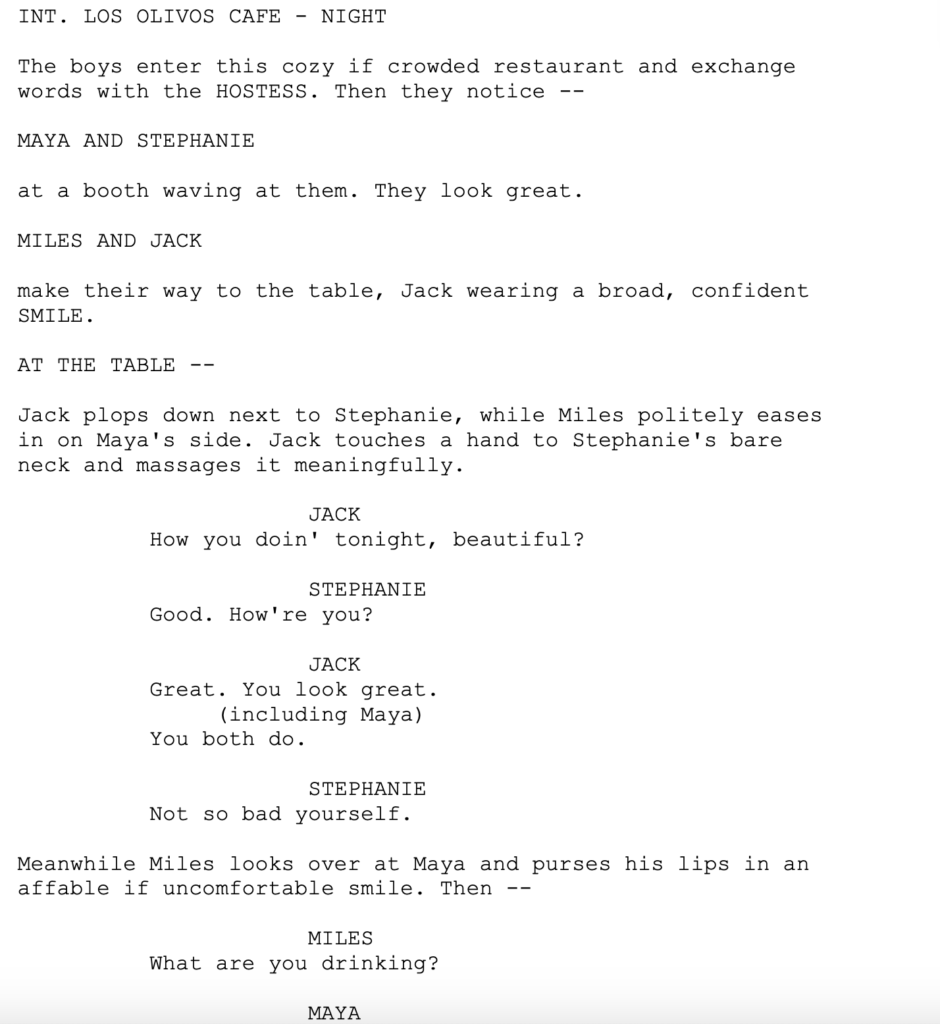
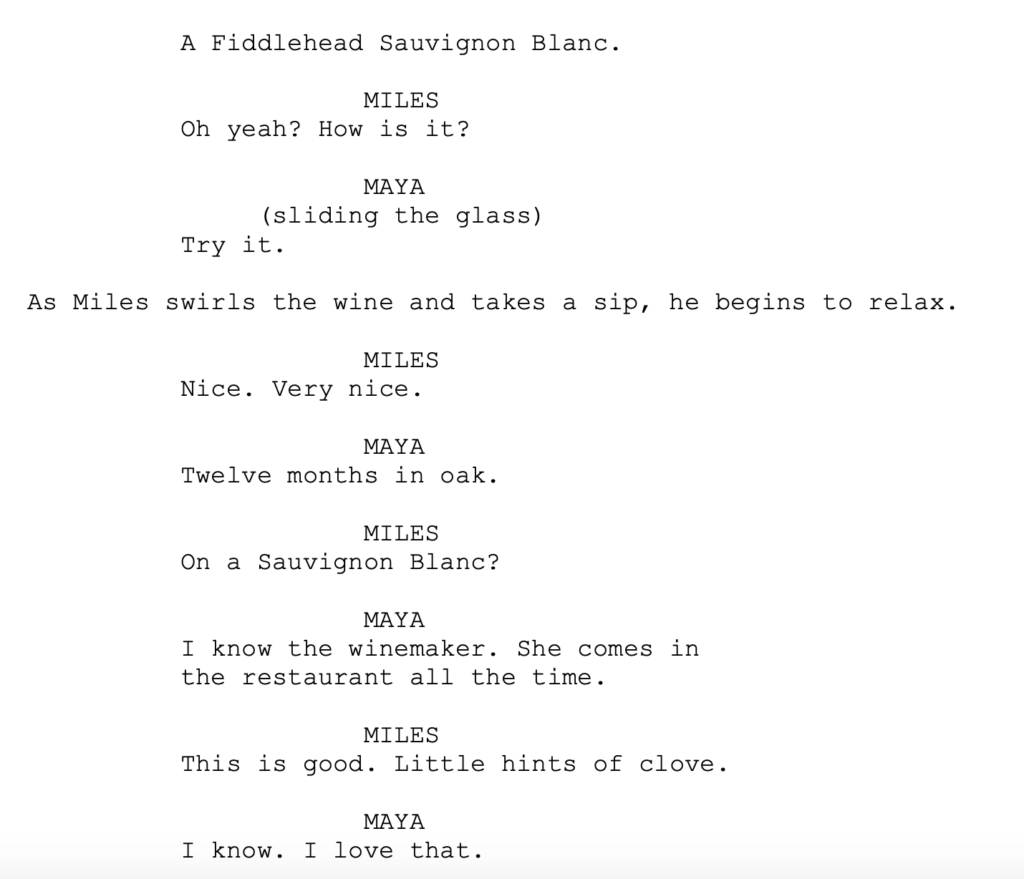
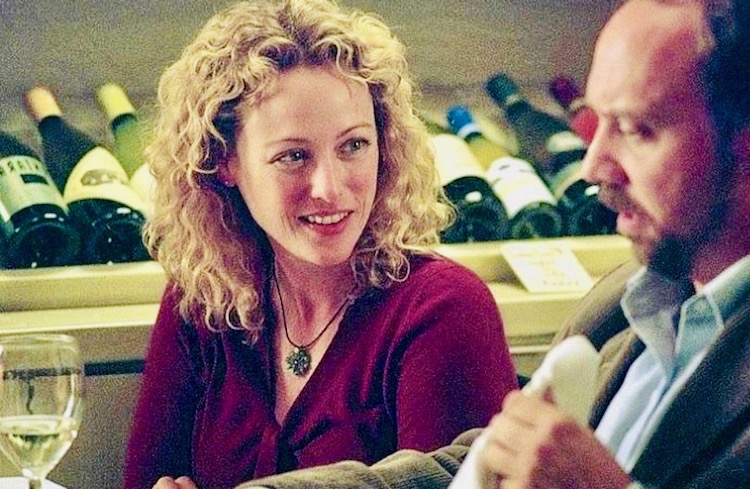
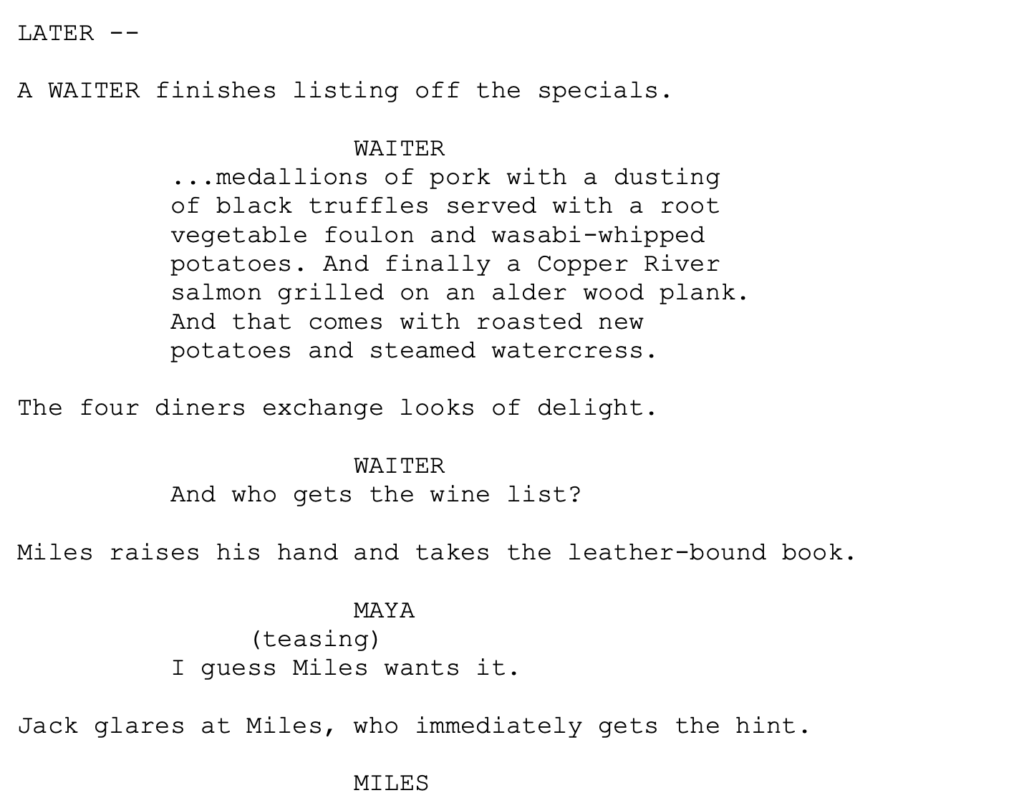
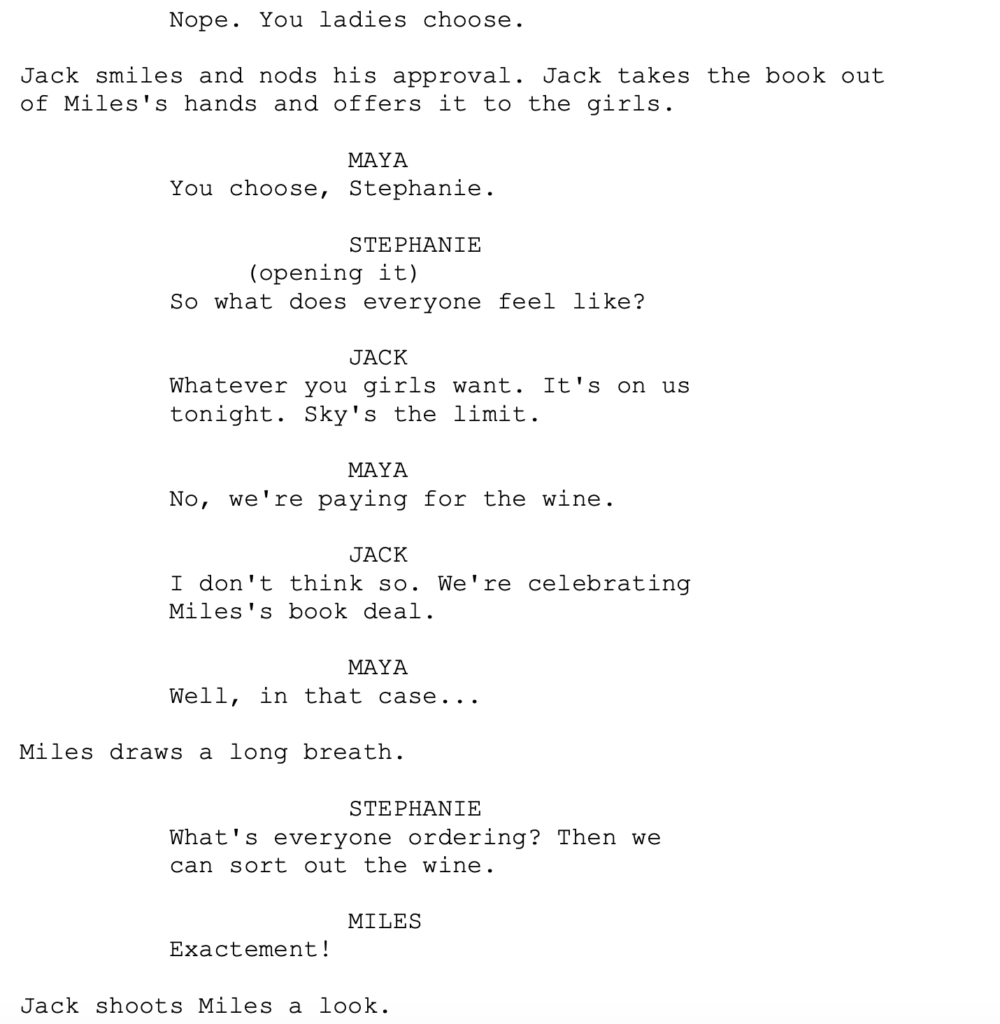
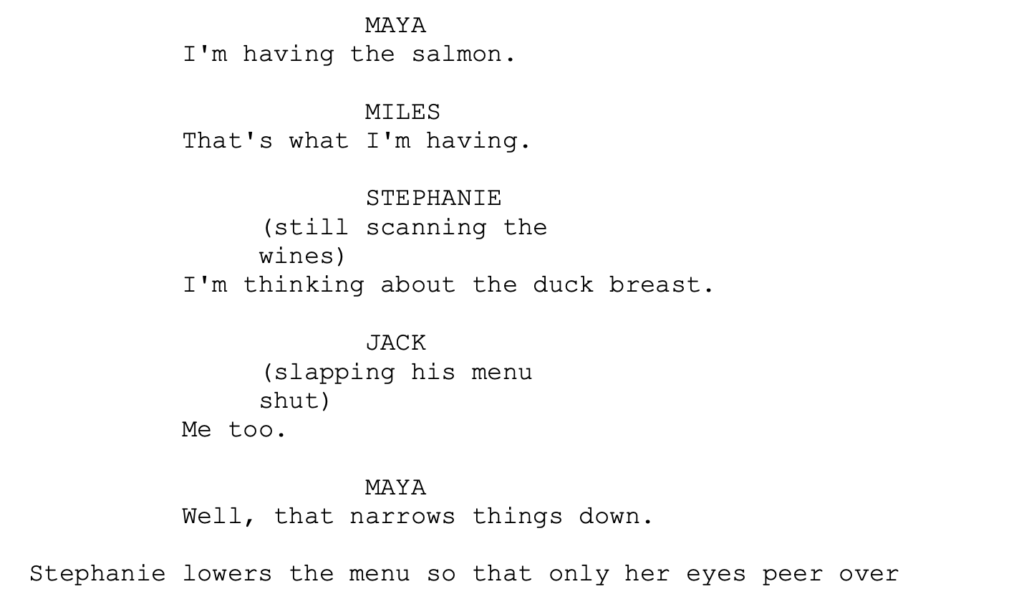
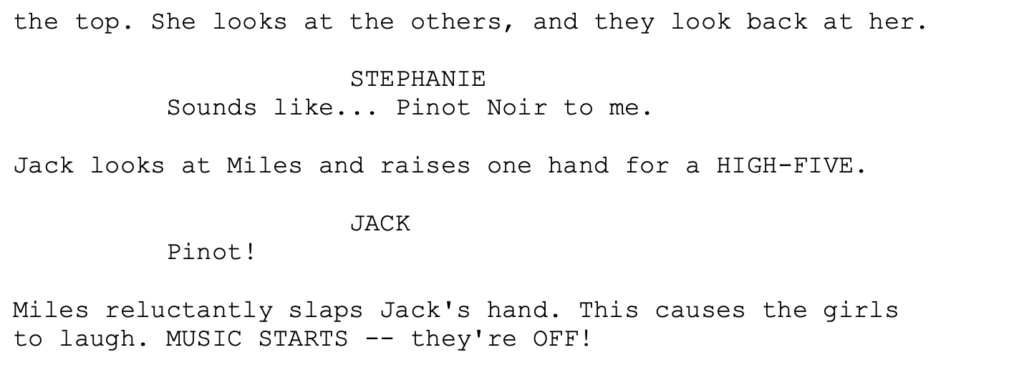
Some might say, “Well, the goal it to decide on what they’re going to eat.” Yeah but that’s not a real scene goal. Ordering in movies is inconsequential, as is the case here as well. Does it matter what they order? No. So it’s chit-chat. It’s the stuff you usually leave out in screenplays.
Now, to be fair, Sideways is a high-brow movie written for well-educated folks 40+ years old who live on the Upper West Side or Beverly Hills. And it’s an indie film. It’s not meant to pull you in and bombard you with drama every five minutes like a big-budget Hollywood film. So the rules are a little different.
With that said, the dialogue does work. It’s fun listening to these friends banter back and forth for two hours. So what’s going on? How is that happening?
There were a few things I learned.
First, I came to realize that the scene goals in indie films can be softer (or more subtle) than in mainstream films. They don’t need to be as big of a deal. So while in a Hollywood movie, the goal of a conversation might be to figure out how to defeat Vulture before he destroys the city, in an indie movie, the goal might simply be to teach another character how to taste wine.
I do think soft character goals in scenes are dangerous. They’re more likely to result in boring conversations. For example, go write your own scene where one character teaches another character how to taste wine. Just how entertaining can you make that dialogue? Especially when nothing’s at stake in the scene.
But a skilled dialogue writer has tools in their toolbox that you don’t yet have and, therefore, know how to navigate these softer scenes to still make the dialogue work.
That leads me to the second thing I discovered, which is that Payne did something long before any of his scenes were written that ensured the dialogue would be entertaining. He made Miles and Jack the most opposite of opposites ever. Miles is a pessimist. Miles’ marriage fell apart. Miles’ book is never getting published. He’s a bitter shell of a man. Jack, meanwhile, sees possibility in everything. He’s optimistic. He’s about to get married. He loves life and loves meeting people. They are polar opposites.
This ensures that even if Payne never once comes up with a scene that has a strong character goal and actual consequences, that the scene is still going to be entertaining on some level due to the fact that these two will never see eye-to-eye. Every conversation they have is going to have a push and pull to it.
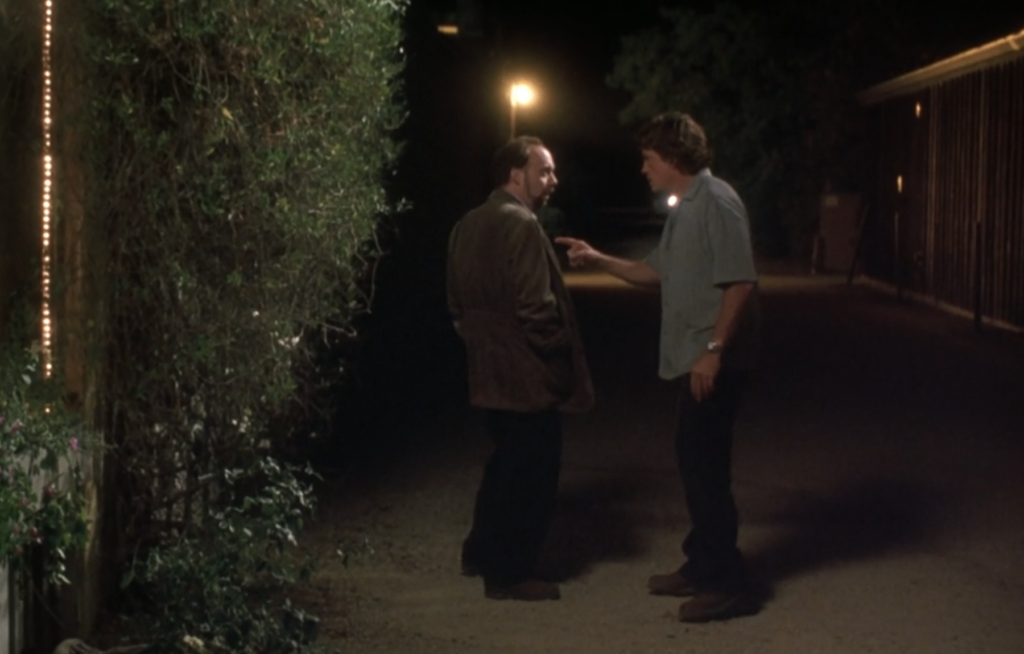
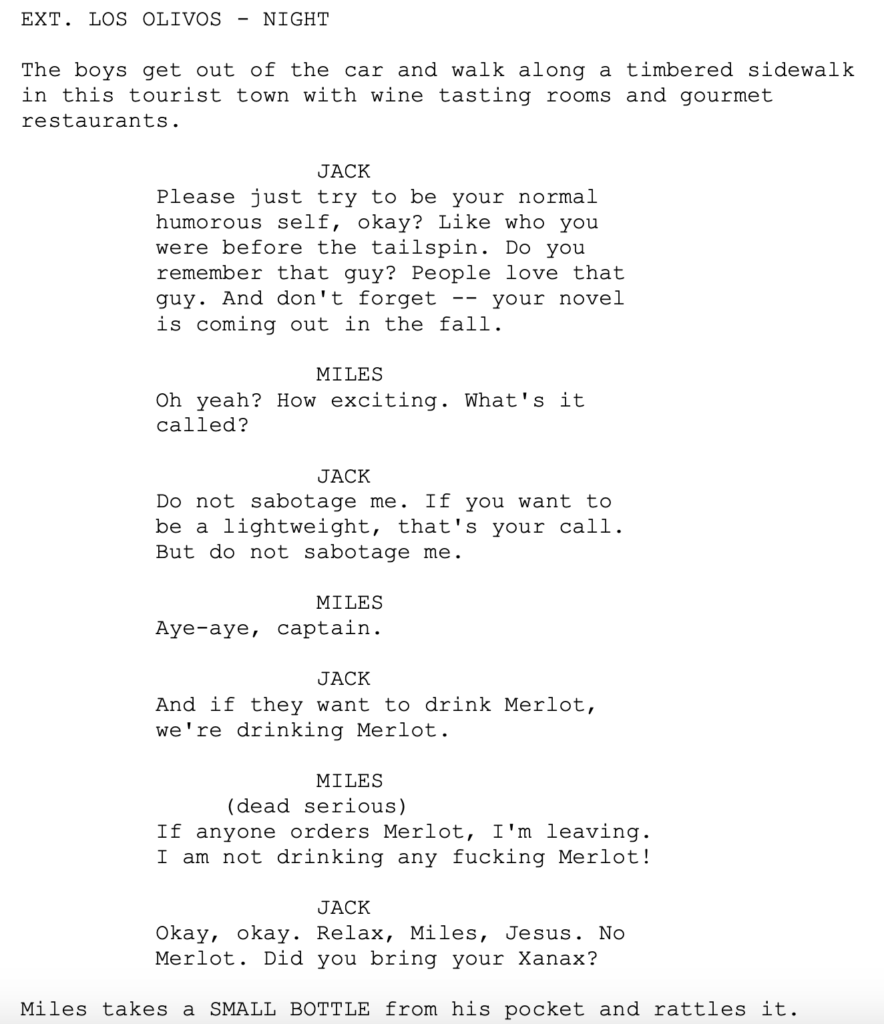
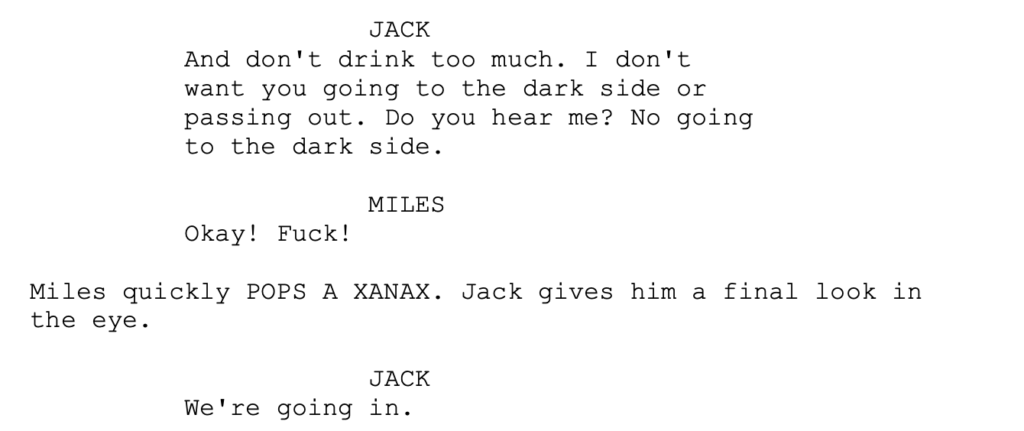
One of the key tenets of my book is, “Conflict solves all.” Because, if all else fails and you’re not doing many of the “proper” things needed to make your dialogue work, conflict can save you because when two people aren’t on the same page, there’s at least going to be some push and pull in the scene that will generate drama. And that’s what Payne so wisely does here. He bakes conflict into the Miles-Jack relationship from the start to ensure that, even when the plot isn’t humming, the conversations will still be entertaining.
Another thing I learned is that a character goal can be extended out beyond the immediate scene. So, in that scene above where the four characters are having dinner, Jack’s ultimate goal is to bed Stephanie. Originally, I was under the impression that dialogue goals needed to be scene specific. But, in this case, the goal is going to take several scenes and that’s okay. This is just the first of those scenes. Therefore Jack does, technically, have a goal. It’s just softer. It’s to establish sexual chemistry in order to get laid later on.
Finally, I learned that there are actually scenarios where nobody having a goal helps the dialogue. In the first scene that I posted, Miles doesn’t want to be talking to Jack’s in-laws. Jack’s in-laws don’t necessarily want to be talking to Miles. I guess they might be a little curious about him but they seem more focused on being polite than anything.
But that’s the reason the scene works. Because dialogue can be fun under awkward circumstances. The fact that nobody actually wants to speak is what makes the speaking fun. Cause we’ve all been in those situations. We’re stuck in a conversation we don’t want to be in and we just try and survive it. The desperate attempts to survive the conversation, wondering when the misery will be over, are what make it funny.
The more I study dialogue, the more complex I realize it is. But it’s really fun to keep learning this stuff and I can’t wait to share the book with you guys.
Also, a new newsletter is hitting your Inboxes this weekend! I’ll be reviewing a big-bugdget screenplay written by two of the biggest sci-fi screenwriters in Hollywood. I never knew these two teamed up on a script so I’m really excited to read it. So if you’re not already on the list, e-mail me at carsonreeves1@gmail.com to get on!
GET $100 OFF A SCRIPTSHADOW SCREENPLAY CONSULTATION! – I’ve read over 10,000 scripts. Done over 1000 consultations. I am the guy who can figure out the issues hampering your script AND HELP YOU FIX THEM so you can start doing better in contests, start getting more responses from queries, and start actually getting jobs in the industry! I have a 4 page notes package or a more detailed 8 page option designed to improve every aspect of your script, from your plot to your characters to your dialogue. I also give feedback on loglines (just $25!), outlines, synopses, first acts, or any aspect of screenwriting you need help with. If you’re interested, e-mail me at carsonreeves1@gmail.com and let’s set something up!
EDIT – WINNERS ANNOUNCED!
So 4 of the top 5 entries consisted of 4 of the top 5 contributors within the group. That gave me some pause. Is everybody here getting a fair shot? With that said, I realize that there’s a couple of things at play here. For one, people are more likely to check out the scripts of the people they know. This isn’t just true here at Scriptshadow. It’s true in Hollywood.
So we’re basically preparing screenwriters for the real world. And just like the real world, if you want to break through that nepotistic malaise that producers either directly or indirectly participate in, give us a concept that makes it impossible to not open your script, then write a first ten pages that makes it impossible for us to put your script down, then write another 100 pages that make it impossible for us to stop reading. It’s just the way it is. And that seems like it’s what’s happened this weekend with Breaking Them Up.
Another thing that factors into this is that the people who participate here tend to be the people who care more about learning the craft of screenwriting. So it makes sense that their scripts, on the whole, would be better than those who aren’t participating. These writers are always learning new tools, building networks with other writers here, using those people to get feedback on their scripts. So it makes sense that their scripts would be better. Hence, I’m excited to announce that the four winners of the Wild Card Round are…
Katherine Botts – Cratchit
David Waddell – Breaking Them Up
Steffan DelPiano – Odysseus and His Boy
Kenneth Kleemann – Hellfire Alley
I’ve already chosen who will participate in the first round of the Quarterfinals next week. Those writers will be personally contacted by me via e-mail and given until Wednesday night to make any last changes to their scripts. Congratulations to everybody here for a tight race and let the Quarterfinals begin!!!
ORIGINAL POST BELOW
YEEEE-HAWWWW! GRAB YOUR GUNS, BOYS! IT’S ABOUT TO GET WILD!
The top 8 scripts have already been chosen for the Quarterfinals of the Scriptshadow Screenplay Tournament. Today we take 8 scripts that gave those winners a run for their money and pit them against each other. You, the readers, will decide which 4 of these wild-cards advance to the quarterfinals. Just like previous weeks, your job is to read as much as you can from each entry and vote on your favorite in the comments section. The top 4 vote-getters will move through and next week we’ll begin the Quarterfinal Round.
Since everyone has a limited amount of reading time and 7 out of 8 of these scripts have been rewritten, I’ll allow the writers to chronicle the changes they made in the Comments Section if they want. It’s no substitute for reading the script, but at least you’ll be able to make a more informed decision.
One last thing: PLEASE VOTE FOR THE BEST SCRIPT, NOT YOUR BEST FRIEND. If you haven’t read any of these scripts and you’re not going to read them this weekend either, I’d rather you not vote at all than cast a vote for a friend. The idea is to have the best scripts competing, not the most popular commenters competing. If the top 4 vote-getters on Sunday are the 4 most popular commenters within today’s grouping, I’m probably going to pick my own top 4 (hey sorry – wild card rules, baby). Let’s find the best scripts here, guys. On to today’s entries!
Title: Felix (new draft!)
Writer: Casey Giltner
Genre: Horror, Coming-of-age
Logline: After his great-grandmother’s death, ten-year-old Felix is troubled by a potentially haunted family heirloom and his father’s increasingly strange behavior.
Title: Breaking Them Up (formerly “Untitled Breaking Up Parents Marriage Comedy”) (new draft!)
Writer: David Waddell
Genre: Comedy
Logline: Convinced that his constantly feuding parents are headed for a divorce, a 14 year old sets out to find new lovers for his mom and dad in hopes of ending their marriage.
Title: Odysseus and His Boy (new draft!)
Writer: Steffan DelPiano
Genre: Period
Logline: With only one night to act, two rival soldiers must sneak behind enemy lines to complete a last-ditch suicide mission that will finally put an end to a decade-long conflict.
Title: Hellfire Alley (new draft!)
Writer: Kenneth Kleemann
Genre: Western/True Story
Logline: The gritty, UNTOLD story behind the real outlaws who inspired the classic film, THE WILD BUNCH.
Title: Widow’s Walk (new draft!)
Writer: Brett Martin
Genre: Contained Thriller
Logline: A psychic breaks into a haunted house to confront a malevolent force from her past that she believes has abducted her daughter.
Title: A Darker Place – (same draft)
Writers: Andrew Rhodes and Robert Irvin
Genre: Contained Thriller/Sci-fi
Logline: In the home of her latest case, an obsessed social worker fights to save a girl being tortured in the basement of that very house … 24 years in the future.
Title: Cratchit (new draft!)
Writer: Katherine Botts
Genre: Mystery & Suspense, Fantasy
Logline: “A Christmas Carol” reimagined, told from the point of view of Bob Cratchit as he and Ebenezer Scrooge race to track down Jacob Marley’s killer — the same killer who now targets Scrooge and Cratchit’s son, Tiny Tim.
Title: 21 Days in the Amazon (new draft!)
Writer: Ben Koch
Genre: Found Footage Horror
Logline: When the cast and crew of the reality show Bared and Scared film an episode in the Amazon, surviving the deadly jungle proves less frightening than surviving an unhinged contestant.
If you’re new to the Scriptshadow Script Challenge, here are all the previous posts…
WEEK 0
WEEK 1
WEEK 2
WEEK 3
WEEK 4
WEEK 5
WEEK 6
WEEK 7
WEEK 8
WEEK 9
WEEK 10
WEEK 11
WEEK 12
Okay everybody, so this upcoming week, you will be finishing your second draft. But for those of you who’ve been lagging behind, fear not. I am giving you five more weeks to get your scripts ready for THE 1ST ANNUAL SCRIPTSHADOW SCREENPLAY TOURNAMENT. Anyone wishing to enter the Scriptshadow Screenplay Tournament will need to submit their script by 11:59pm Pacific Time, Sunday, September 4th. Here’s what you want to include in the e-mail.
All entries should be sent to: Carsonreeves3@gmail.com with subject line: “SCRIPTSHADOW TOURNAMENT.”
Title
Genre
Logline
Why You Should Be Picked
From there, I will be picking between 40 and 64 screenplays to compete in the tournament. Since this is unprecedented and nobody has done it before, I’m going to be figuring out a lot of this as I go along. But basically, Saturdays will become Scriptshadow Tournament days as opposed to Amateur Offerings days. You guys will be voting on which scripts go through each round, just like you vote for which scripts get a Friday review.
How do we know which scripts were written for this contest and which weren’t? We don’t! The large majority of people who follow this site do not comment. And I’m not going to exclude them from the contest. So we’re going by peoples’ word here. As far as which scripts I choose for the tournament, it’ll be no different from picking scripts for the Scriptshadow 250. The best overall presentations (concept and pitch) get in.
So get those scripts ready people! Let’s find something great. :)
Deep Cover with Lawrence Fishbone and The Blume!
Sorry no Amateur Offerings yesterday. The rest of the year is going to be hit or miss on posts. Gotta keep you guys on your toes. And, you know, Scriptshadow 250. Today’s movie suggestion actually has a dual purpose. You see, in tomorrow’s Force Awakens review, I’m going to go kamikaze on the character of Finn. And Fishburne’s character here in Deep Cover is what I’ll reference as THE RIGHT WAY to do what JJ and Kasdan messed up with in Awakens. I won’t give anything away more than that. The loose logline for Deep Cover is, “A policeman is recruited by a devious drug enforcement agent to infiltrate a smuggling organization seeking to expand into designer drugs.” This is an awesome movie. If you haven’t seen it already, I hope you enjoy it!
For those of you who have been following my Twitter and searching my hashtag #ss250, you may have experienced my disappointment last night. Script after script failed to come anywhere close to impressing me. And while there were different reasons for different scripts, I have started to notice a trend.
Writers will write a really intriguing opening scene that ropes the reader in, but then when they get past that scene, they bore the reader to fucking pieces. Pardon my French, but it’s happened so much that I’ve lost my marbles. And here’s what I think is happening. The opening scene doesn’t require any structure. There is nothing required of you other than to write something cool, shocking, mysterious, etc. Since it’s fairly easy to do that, no one has trouble with this scene (well, almost no one).
The second this scene is over, every writer goes into this dated Blake Snyder 1996 Beat Sheet Perfect 3-Act Structure Mode. They show absolutely no interest in trying to hide this. They might as well write above their scene: “This is the scene where my main character saves the cat.” “This is the scene where I establish my main character’s flaw.” “This is the scene where my protagonist encounters the inciting incident.”
Guys, the whole point of structure is to help you write the script. Structure should never be present ON THE ACTUAL PAGE. It should be invisible. The second people start understanding what it is you’re doing, suspension of disbelief is eliminated and you’ve lost the reader. So instead of following some page-dependent ancient structural paradigm, just focus on the main story beats (end of act 1, character goes on their journey, middle of act 2, mid-point twist, end of act 2, hero at his lowest point).
But within each act, play more. Be less predictable. Your only job is to make the reader want to keep turning the pages. To do that, just keep dangling story carrots out there. Questions that the reader will want answered. It doesn’t matter how you do this, as long as you do it. Structure is your friend. But it’s just as bad if you’re a slave to it as if you don’t use it at all.
Here’s to hoping tomorrow’s scripts fare better!

